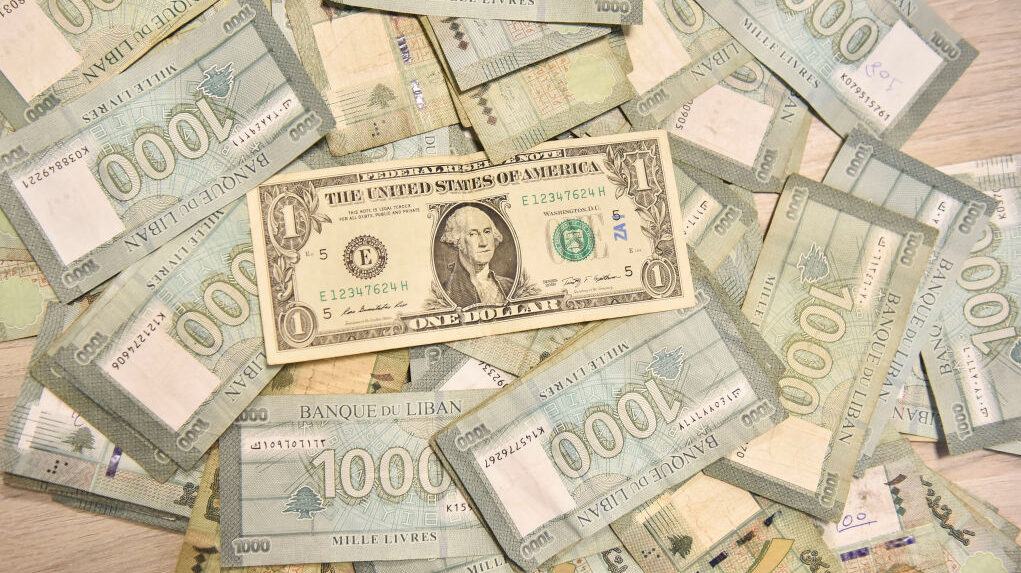As Lebanese Pound Depreciates, More US Dollars Are Flowing Into the Country
The Mediterranean country’s economy is experiencing a process of unofficial dollarization with more businesses pricing their products in the foreign currency
(Beirut) Buying groceries in Lebanon has stopped being a nightmare for some residents with access to an ubiquitous foreign currency, who are able to leave their calculators at home. But for others, it is still an impossible mission. Since the depreciation of the local currency, the Lebanese pound, many supermarkets, businesses and restaurants are pricing their products in a foreign currency – the American dollar.
Two years ago, studies showed that just 13% of families in Lebanon have access to dollars; this means that, in a country where three-quarters of the population fall under the poverty line, living is still a struggle for many.
In recent months the Lebanese pound, also called the lira, has been in free fall. Before the crisis, which began in 2019, the currency had kept its value for 22 years at 1,507 pounds to the dollar. But, since the start of the country’s economic debacle, the pound hasn’t seen a day without depreciating. During these nearly four years, the pound has lost 98% of its value. Now it has stabilized to around 100,008 pounds to the dollar. Because of this, the dollarization of the country is seen as something necessary, and it’s not really a new phenomenon.
Lebanese banks give loans in US dollars, in a currency that Lebanon doesn’t provide, doesn’t print and doesn’t supply
“The concept of dollarization existed in the 1980s during the civil war, because we didn’t trust our local currency and people decided to choose another currency,” said Layal Mansour Ichrafieh, a macroeconomist who specializes in dollarized and developing countries. “Since then, Lebanon has always been considered a very highly dollarized country and one of the most dollarized countries in the world,” she told The Media Line.
The scenario from the 1980s is very similar to the current time. There has not been an official decision by the authorities to adopt the dollar as the most popular currency. Rather, consumers have been the ones choosing to move to more stable bills. “Lebanese banks give loans in US dollars, in a currency that Lebanon doesn’t provide, doesn’t print and doesn’t supply,” Mansour Ichrafieh said. “This is what we call in economics partial, or unofficial dollarization.”
“Pricing in dollars is a good solution now, because the lira is not stable at all,” said Joseph Bitar, an expert in Lebanon’s monetary policy. “When you have a stable unit on the ground such as dollars, everyone knows more about what they are paying, so it protects the customers who are the ones who have been suffering the most,” Bitar, who is also a professor of economics at the IESEG School of Management in France, told The Media Line.
US dollars have been an integral part of the Lebanese economy for decades now. Before the crisis, deposits in foreign currencies, mainly in American dollars, accounted for about 68.8 % of total bank deposits. “There used to be a lot of dollar liquidity, but now banks cannot pay their customers their dollar holdings and deposits,” Bitar lamented.
“In economics, the dollarization rate is considered a vulnerable indicator because a high rate of dollarization means the country is dealing with a currency that they don’t supply and this is risky,” Mansour Icharafieh said. “In this context, their monetary policy and the Central Bank role are highly ineffective,” she added.
Bitar agrees. “If we had had a competent and not corrupt Central Bank, we wouldn’t have reached this situation,” he said. A solution, according to Bitar, “all comes down to political reform.”
“Money and currency are an institution, so if we have a weak institution we cannot sustain a currency; any institutional solution is not possible for me now because the institutions are weak and corrupt,” he added.
Many are afraid that this high dollarization will leave even more people behind. A study by the American University of Beirut found that in 2021 only 13% of families had access to dollars, leaving the vast majority of Lebanese citizens without access to greenbacks. On top of that, today the salaries of many in Lebanon are worth a tiny fraction of their pre-crisis income. This same study showed that each family only had access to an average of three million to five million liras every month, which was worth $30 to $50. Now, it is even less.
Inequality and disparity already exist in Lebanon, but somehow the dollarization of the country will increase them between those that get paid in dollars and those that get paid in liras because those who are paid in dollars will be more wealthy
Despite pricing life in dollars, there actually are not many found in the country. Over 90% of the population earns their income in Lebanese pounds, according to a 2022 survey by the International Labor Organization and the Lebanese government’s statistics agency. “Always during a crisis or a war, the rich get richer and the poor get poorer, so the inequality increases,” explained Mansour Ichrafieh.
“Inequality and disparity already exist in Lebanon, but somehow the dollarization of the country will increase them between those that get paid in dollars and those that get paid in liras because those who are paid in dollars will be more wealthy,” she said. “That is why we have to give up the Lebanese lira, and we have to earn, pay and function only in US dollars,” Mansour Ichrafieh asserted.
From what he calls a more “liberal point of view,” Bitar supports this natural inequality created by the market. “Those who will get paid in lira are mostly government employees, and they are part of the corruption of the country and are at the origin of the crisis, so they should be punished somehow,” he concluded.


